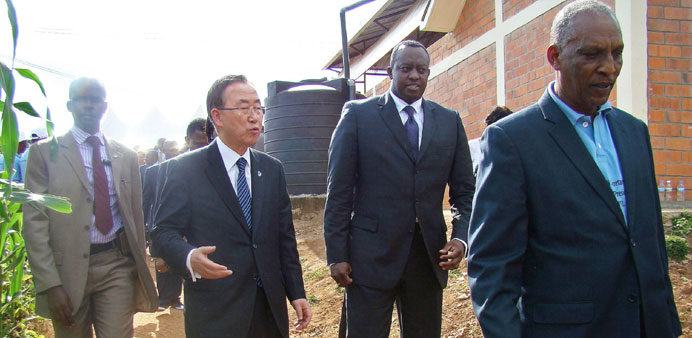|
UN chief Ban Ki-moon pledged yesterday that UN troops will be in place within “one or two months” to battle armed rebels in the Democratic Republic of Congo’s volatile east, as he toured the flashpoint city of Goma. |
Ban’s visit came after three days of sometimes deadly fighting between rebels and government forces that ended a precarious calm spell in the mineral-rich east of the country, an area gripped by conflict for more than two decades.
The latest bout of fighting near Goma, which was briefly seized by the M23 rebel group in an armed uprising last year despite the presence of a large UN peacekeeping force, has sent thousands of people fleeing.
But the Congolese army and rebel forces said the situation on was calm. Ban later travelled to Kigali, capital of neighbouring Rwanda, a nation that plays a key role in the region, and has been accused by the UN of backing M23 fighters, claims it denies.
Ban had said earlier this week that deployment of a UN intervention force made up of about 3,000 African troops should be accelerated.
Yesterday, the UN chief gave a firmer deadline, saying: “It will arrive (in) about one or two months.”
The force made up of Tanzanian, Malawian and South African soldiers was approved by the UN Security Council in March as its first ever “offensive” peacekeeping brigade.
It will join the 17,000-strong peacekeeping force—the biggest currently deployed in the world by the UN—already in place in DR Congo, but it will have an additional mandate of fighting and disarming the rebels.
The latest unrest was unleashed barely a week after the first troops from the UN “offensive” brigade arrived in the east, an area rich in minerals including gold and coltan, which is used in cell phones and other electronic equipment.
Both Kinshasa and the M23 have accused each other of launching hostilities and trying to scupper peace efforts in the restive east. The rebels had earlier announced a “cessation of hostilities” for Ban’s visit.
The government said Tuesday that 19 people had been killed in the fresh surge of fighting, while the UN peacekeeping mission reported that a rocket launched from a rebel position on Wednesday had killed one person.
World Bank president Jim Yong Kim, who is accompanying Ban on the regional tour, on Wednesday pledged $1bn in aid as part of a UN-brokered accord aimed at bringing peace and stability to the region.
“We believe it offers the best hope for peace in a generation,” Ban said of the agreement signed by 11 regional countries in February after the M23 uprising.
“But that agreement must translate into concrete actions,” he said after meeting Congolese President Joseph Kabila at the start of his regional tour, that will also take him to Uganda and onto an African Union summit in Ethiopia.
In Goma, Ban visited a hospital which mainly treats victims of sexual abuse.
Despite its vast mineral wealth, the DR Congo—which covers an area roughly the size of western Europe—is ranked by the UN as the world’s least developed and has been devastated by some of Africa’s deadliest wars.
The M23 rebellion in the east last year, which led to the brief capture of Goma in November, threatened to drag the region into a fresh fully-fledged war amid claims by the UN and Kinshasa that Rwanda and Uganda are backing the M23.
Regional and international diplomatic pressure forced peace talks on the warring parties but fresh fighting broke out on Monday. While the government said 15 rebels and four army troops died in the clashes, the M23 said the figures were inflated.
The UN’s refugee agency said the fighting, had forced around 30,000 displaced civilians to flee temporary shelters.
The M23 - a largely ethnic Tutsi group of former army defectors—has vowed to retaliate if attacked by UN troops but said it does not intend to retake Goma.
The UN has accused the M23 of a string of rights abuses including arbitrary executions, forced disappearances, degrading treatment and rape of civilians.

